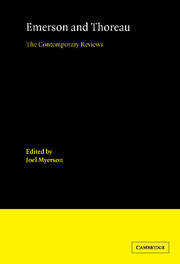Book contents
- Frontmatter
- Contents
- Series Editor's Preface
- Introduction
- RALPH WALDO EMERSON
- Nature (1836)
- “The American Scholar” (1837)
- “Divinity School Address” (1838)
- “Literary Ethics” (1838)
- Essays [First Series] (1841)
- “The Method of Nature” (1841)
- Essays: Second Series (1844)
- Poems (1847)
- Essays, Lectures, and Orations (1847)
- Nature; Addresses, and Lectures (1849)
- Representative Men (1850)
- English Traits (1856)
- The Conduct of Life (1860)
- May-Day and Other Pieces (1867)
- Society and Solitude (1870)
- Letters and Social Aims (1876)
- HENRY DAVID THOREAU
- RETROSPECTIVE ESSAYS BY CONTEMPORARIES
- Index
“The Method of Nature” (1841)
Published online by Cambridge University Press: 23 March 2010
- Frontmatter
- Contents
- Series Editor's Preface
- Introduction
- RALPH WALDO EMERSON
- Nature (1836)
- “The American Scholar” (1837)
- “Divinity School Address” (1838)
- “Literary Ethics” (1838)
- Essays [First Series] (1841)
- “The Method of Nature” (1841)
- Essays: Second Series (1844)
- Poems (1847)
- Essays, Lectures, and Orations (1847)
- Nature; Addresses, and Lectures (1849)
- Representative Men (1850)
- English Traits (1856)
- The Conduct of Life (1860)
- May-Day and Other Pieces (1867)
- Society and Solitude (1870)
- Letters and Social Aims (1876)
- HENRY DAVID THOREAU
- RETROSPECTIVE ESSAYS BY CONTEMPORARIES
- Index
Summary
We are bound to thank the author, Mr. Ralph Waldo Emerson, for a copy of his Oration delivered before the Adelphi Society of Waterville college, (Maine,) in August last. It is the production of one who thinks much, often deeply, but who writes muddily; and this latter quality, we are sorry to be compelled to add, is the evident result of an imitation of the German- English system of Thomas Carlyle, which whoso handleth, not being expert therewith, useth an edged tool, and will assuredly be wounded thereby. There is thought enough in this production to furnish forth half a dozen of your modern college orators; but there is nevertheless not a thought in it, which is worthy any thing, that would not have produced tenfold more effect had it been left open to the hearer or reader's mind, instead of being covered with a grotesque garb of motley language. Now and then in a striking simile or felicitous illustration Mr. Emerson approaches the visible and the natural; as in this passage, for example: The universal does not attract us until housed in an individual. Who heeds the waste abyss of possibility? The ocean is everywhere the same, but it has no character until seen with the shore or the ship. Who would value any number of miles of Atlantic brine bounded by lines of latitude and longitude? Confine it by granite rocks, let it wash a shore where wise men dwell, and it is filled with expression; and the point of greatest interest is where the land and water meet.
- Type
- Chapter
- Information
- Emerson and ThoreauThe Contemporary Reviews, pp. 109 - 110Publisher: Cambridge University PressPrint publication year: 1992



